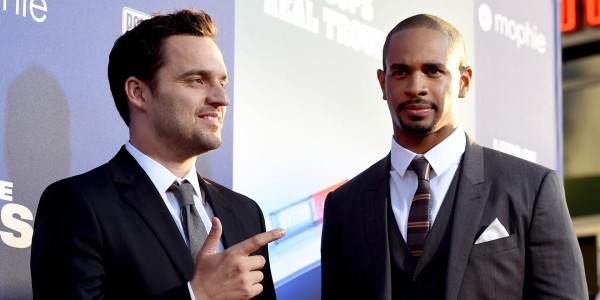When Samuel Barrett and Dominic Cooper landed the roles of Posner and Dakin, respectively, in Alan Bennett’s play “The History Boys,” they were expecting an 80-show run at England’s National Theater.
Instead, the parts lasted for nearly three years, leading to a world tour that included a Tony-honored run on Broadway, stops in Australia, New Zealand, Hong Kong and Los Angeles — and finally a movie adaptation with them keeping their roles.
“You don’t get jobs like this,” says Barrett. “None of us were names, so we thought even if there was a film, it certainly wouldn’t be with us. Definitely not with us.”
Not only did Barrett and Cooper (both 26) remain for the film, the whole cast did — including Frances De La Tour and Richard Griffiths, who both won Tonys for their performances on Broadway. Bennett wrote the screenplay himself, and the play’s director, Nicholas Hytner, stepped behind the camera — making it an unusually faithful adaptation.
Barrett and Cooper play two of the eight students at the center of Bennett’s play, which takes place in Northern England during the 1980s. All are prepping for their university entrance exams, hoping for either Oxford or Cambridge.
They are taught by three teachers, including Hector (Griffiths) — a large, poetic man who romantically teaches knowledge for knowledge’s sake — but fondles his male students while they ride with him on his motorcycle.
His rival is Irwin (Stephen Campbell Moore), a young professor new to the school who teaches pragmatically for the exam. The third teacher is Mrs. Lintott (De La Tour), who memorably deadpans that history is “a commentary on the various and continuing incapabilities of men. What is history? History is women following behind with the bucket.”
Hytner, a theater vet and director of the National Theater, made his first foray into film adapting Bennett’s “The Madness of King George” in 1994. His other movies include “The Crucible” (1996) and “The Object of My Affection” (1998).
“I can’t think of another recent example of a film which has used the entire ensemble without any difference that played the play,” says Hytner.
Creators worked hard to keep the film intimateHytner and Bennett worked to protect their freedom to maintain the cast by keeping the production short and inexpensive; it was shot in just six weeks before the play’s world tour. Distributed in the U.S. by Fox’s boutique independent studio, Fox Searchlight, they took a willfully modest approach since higher financial aspirations would have likely meant Hollywood names.
Slideshow 26 photos
Celebrity Sightings
Likewise, Hytner and Bennett changed the play (which debuted in May 2004) only in minor ways — adding a few peripheral characters and moving a handful of scenes outside of the classroom. But there’s no question “History Boys” the film is much the same as “History Boys” the play.
“Getting intimate with looking inside these people, making the camera an intimate participant in their small world,” Hytner says of the process. “It wasn’t about using the camera to give a sweeping quality to who they are.”
Hytner kept three film adaptations of plays in mind when making “History Boys,” each which he believes “don’t compromise the enclosed world of the play”: “A Streetcar Named Desire,” “The Philadelphia Story” and “Who’s Afraid of Virginia Woolf.”
While most adapted films use the medium to expand from stage sets, Hytner — for better or worse — opted to keep most of the action at the school and focus on the dialogue. In one scene where the students act out a French brothel, Hytner shot the action handheld to capture the frenetic, quick wit.
“I sometimes think, ‘Oh God, should we have done the whole thing handheld to give it all a rough edge?”’ says Hytner. “But the truth is, it’s the mind that’s flashing in the classroom scenes. They are static; their minds very much aren’t.”
Cast linked foreverCooper thinks keeping the same cast allowed such scenes to play naturally.
“That we worked together as an ensemble, I think it does come across on screen,” Cooper says. “I think it would have been very difficult to get a new bunch together to film that because it’s all about our behavior together. We need to believe those guys have been together as long as they have.”
Barrett believes he, Cooper and the other six boys of the play will remain forever close after such a formative experience: “It is going to be births, deaths and marriages among ourselves for the rest of our lives.”
“We’ve been doing this three years and we’ve grown up as people,” says Barrett, whose character is shy, fragile young man in love with Cooper’s Dakin. “Your qualities change. I felt that I’ve moved further and further away from my character.”
“The History Boys,” in fact, continues. With a different cast, it will open in London’s West End for a 17-week run in December.
The play and film, though, are finally over for Cooper and Barrett, whose recent trip to New York to publicize the film was their final official day as “History Boys.”
“This is our last day in three years,” says Barrett with a sad smile. “I need a day off.”
